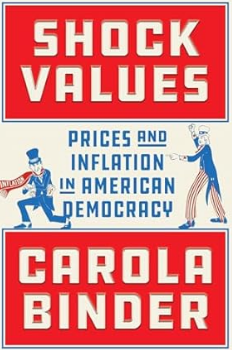
Book Bits: 25 May 2024
The Capital Spectator
● Shock Values: Prices and Inflation in American Democracy
Carola Binder
Interview with author via Marketplace.org
The word “inflation” is everywhere today, and it continues to shape how people feel about the economy. That’s the case despite the pace of inflation retreating from its high of June 2022, when prices were up nearly 9% from the year before, as measured by the consumer price index. Last month, prices were up only 3.4% on an annual basis. While it’s easy to think those feelings are unique, inflation has long been a top concern for Americans, going back to the founding of the country. One key thing that’s changed is how the government has intervened in the movement of prices… In her book, “Shock Values: Prices and Inflation in American Democracy,” Binder looks back at the long history of politics, inflation and how the government has tried to respond, at times through fiscal policy like price controls, at others with monetary policy.
● Plastic Capitalism: Banks, Credit Cards, and the End of Financial Control
Sean H. Vanatta
Summary via publisher (Yale U. Books)
American households are awash in expensive credit card debt. But where did all this debt come from? In this history of the rise of postwar American finance, Sean H. Vanatta shows how bankers created our credit card economy and, with it, the indebted nation we know today. America’s consumer debt machine was not inevitable. In the years after World War II, state and federal regulations ensured that many Americans enjoyed safe banks and inexpensive credit. Bankers, though, grew restless amid restrictive rules that made profits scarce. They experimented with new services and new technologies. They settled on credit cards, and in the 1960s mailed out reams of high-interest plastic to build a debt industry from scratch. In the 1960s and ’70s consumers fought back, using federal and state policy to make credit cards safer and more affordable. But bankers found ways to work around local rules. Beginning in 1980, Citibank and its peers relocated their card plans to South Dakota and Delaware, states with the weakest consumer regulations, creating “on-shore” financial havens and drawing consumers into an exploitative credit economy over which they had little control. We live in the world these bankers made.
● Money Capital: New Monetary Principles for a More Prosperous Society
Patrick Bolton and Haizhou Huang
Summary via publisher (Princeton U. Press)
A conventional economic theory, monetarism, holds that inflation is a monetary phenomenon
The full article is available here. This article was published at The Capital Spectator.
Comments are closed for this article!